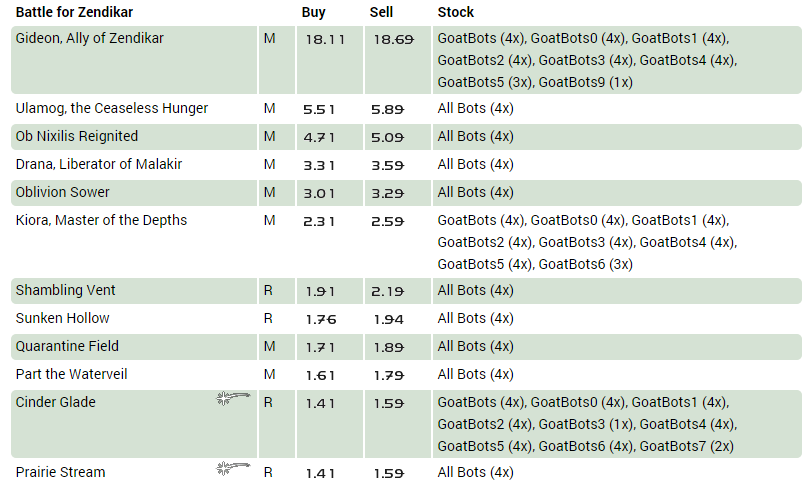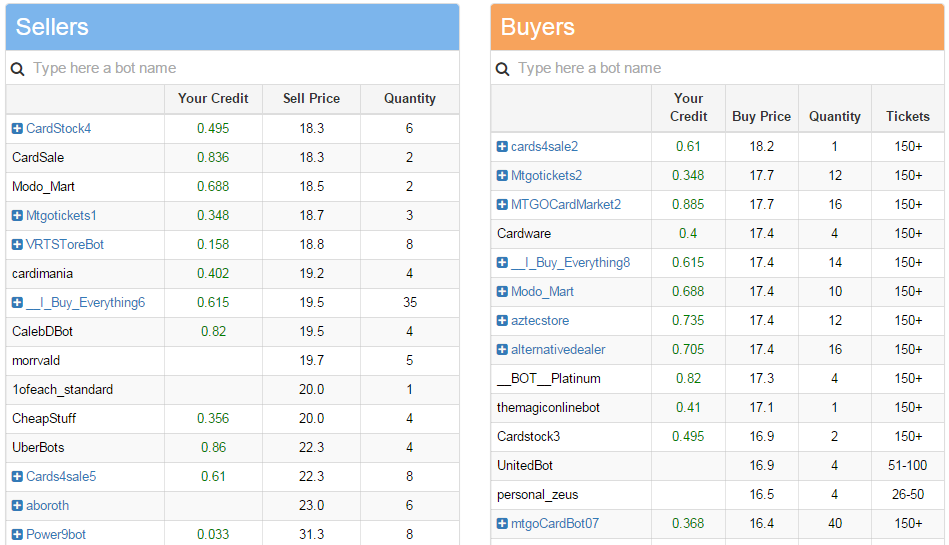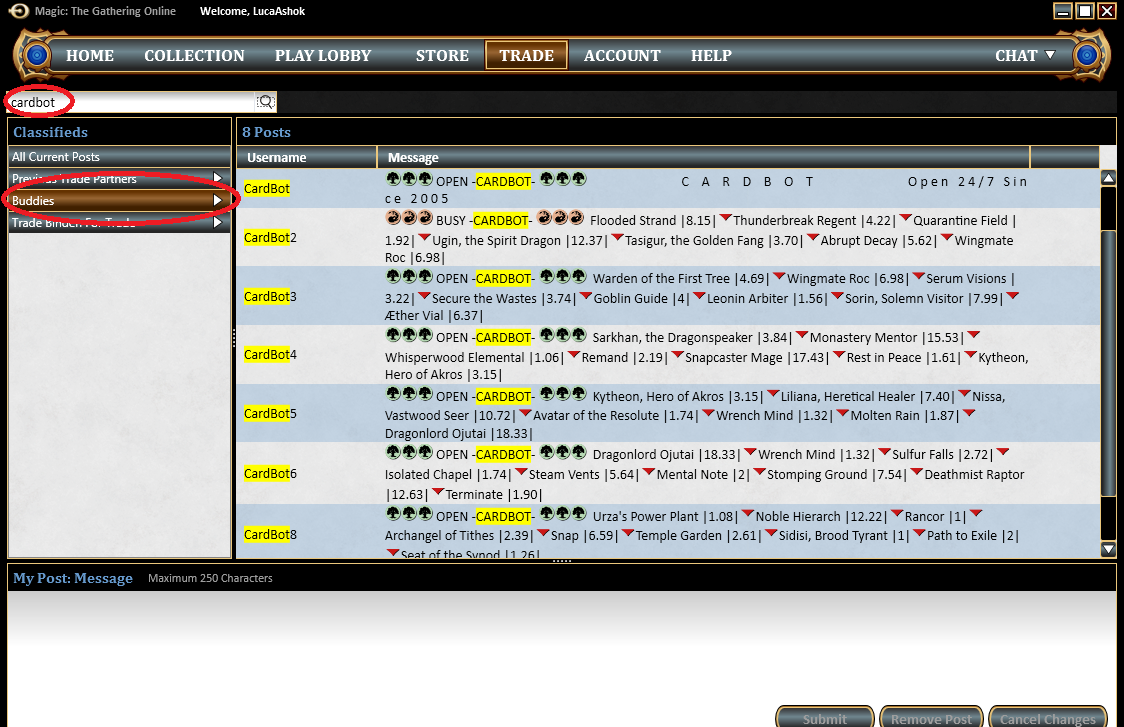Are you a Quiet Speculation member?
If not, now is a perfect time to join up! Our powerful tools, breaking-news analysis, and exclusive Discord channel will make sure you stay up to date and ahead of the curve.
Let's cut to the chase. I'm here to help you make money. I'm not here to entertain or impress you. I'm here to pass on what I know about Magic finance in a way that can be applied to your own personal situations.
A few quick notes about myself. I've been a Magic player for 17 years. I also spent two years in grad school studying game theory, especially in its applications to financial markets. As a result, my approach to Magic finance comes from a more theoretical perspective, which I aim to share in my articles.
About eight months ago I lost in the finals of an online PTQ, which presented me with an important decision. I could either redouble my efforts to qualify for the Pro Tour or call it quits and try something else. I chose the latter and decided to shift my focus to the financial aspects of Magic to see where it took me. The goal of my articles will be to communicate what I've learned so far over the course of this (ongoing) journey.
I'll start today by discussing the mechanics that underlie any successful trading strategy on MTGO.
An Argument for MTGO Over Paper
Over the past eight months I have been drawn heavily towards digital speculation targets as opposed to physical ones. Here's why:
- Lower transactions costs. There is a distinct advantage to trading digital cards in that you can circumvent any costs related to shipping, wear and tear, sorting, etc. This effect multiplies when you implement automation through bots, by reducing opportunity cost in the form of effort and time.
- Larger price fluctuations. There are typically much larger fluctuations in the prices of online cards. This presents a greater opportunity for profit.
- Higher liquidity. In a matter of minutes you can sell hundreds or even thousands of cards. The faster buying and selling process lets you take greater advantage of price fluctuations with a higher total number of transactions.
For these reasons I will primarily dedicate my articles to speculating on MTGO.
Tools of the Trade
In order to make money buying and selling on MTGO, you must first understand the mechanics that make it possible. These mechanics can be divided succinctly into four categories:
- How to buy tickets with cash
- How to buy cards with tickets
- How to sell cards for tickets
- How to sell tickets for cash
(Although it is certainly possible to buy and sell cards with cash, I have not found any practical uses for it and therefore do not discuss it.)
One of the very first things I did when I wanted to learn about MTGO finance was to read every single article written by Sylvain Lehoux and Matthew Lewis on QS. I cannot recommend this enough. Over the span of their articles, they cover all MTGO mechanics in detail, and much of what I know about these mechanics (and all of MTGO finance in general) I learned from them.
1. Buying Tickets With Cash
For most people, MtgoTickets will be the go-to place for buying tickets. To my knowledge, it is the cheapest place to buy tickets without running the risk of getting scammed. Because mtgotickets.com themselves have to deal with scammers, you may be limited on the amount of tickets you can buy from them. When you hit your quota you'll have to find alternatives or buy directly from the MTGO client.
In the absolute best-case scenario, you'll be able to buy tickets directly from a trusted individual at even cheaper prices than a store like mtgotickets.com.
Overall, I feel this step is not of particular importance. The difference between the best- and worst-case scenarios isn't great, with ticket prices ranging from $0.85 to $1.05. The amount of money you make from speculation will hinge much more on the quality of your investments.
If you shift from a biannual 20% portfolio return to 40%, it will take just two years to almost double your money, due to the increased quality of investments. Your main focus should lie here.
2. Buying Cards With Tickets
Now things start to get interesting. Buying can be broken down into two broad categories:
- Buying cards with a bot
- Buying cards manually
Botting is a more advanced technique that trades off lower quality pricing for higher scalability. I think it makes sense to first understand manual trading and then graduate to botting when you want to scale.
If botting sounds interesting to you, I would check out mtgolibrary.com to get your feet wet. That's the software I use since it's crucially linked to a centralized price listing in MTGO Wikiprice.com. ClanTeam will also provide botting software, and I'm sure there are further options besides them. This will be a topic for future articles.
So, manual trading. MTGO is made in such a way that trading between humans is possible but extremely unwieldy. To buy or sell a card to another human you can search for a particular card on the classifieds, although this will almost never work out. The vast majority of your manual trades, therefore, will be done with a bot.
How do we pick the best bots to trade with? It begins with a solid understanding of the bot credit system.
One of the awkward features of the MTGO economy is that the main form of currency cannot be divided beyond a single ticket. The current solution is for bots to save fractional credit that can be used on future trades.
This is how I conceptualize bot credit in my decision-making process: assuming a uniform distribution of leftover credit, when you choose to use a bot you are paying a 0.5 tix sunk cost to gain access indefinitely. Let's say you intend to buy five cards, lifetime, off a new bot. You'll break even if you make at least 0.1 tix profit per card. If you instead plan on buying 100 cards lifetime, you'll break even with at least .005 tix profit off of each card, and so on.
You can imagine that for good bots, you will be buying thousands of cards and the decision to start using these bots will be a no-brainer. Some bot credits can be used across multiple bots that form a "bot chain." For these bots the initial 0.5 investment effectively allows you access to every bot in the bot chain.
The best strategy for buying cards manually from bots is fairly intuitive. If you want to buy a particular card, search for the bot that offers it at the lowest price. If you have already been using that bot chain, grab the card. If not, consider whether the new bot chain is worth investing your 0.5 tix sunk cost. Eventually you'll get a feel for which bots are likely to have the best prices and just check between your trusted bots.
My current routine is to check MTGO Wikiprice, Goatbots and Cardbot. Sometimes I will also check ClanTeam bots (mtgoclanteam.com). The nice thing about these websites is you can see prices without having to open a trade within the client. This can save valuable time. Here's what goatbots.com and mtgowikiprice.com look like:
A note on bot pricing. Since many bots don't have access to any kind of real-time pricing data, they use their own algorithm to slowly arrive at the correct market price. The algorithm works like this: If they're getting more sales on a card than buys, they slowly increase the price. If, on the other hand, they're getting more buys than sales, they slowly decrease the price.
This means bots usually will sell you up to a playset of a card at a time and increase the price on every subsequent playset (or decrease the price if you're selling to them). Sometimes you can game the system a bit by buying three copies of a card, and then four more copies, all at the original price. (I've had it work for me before on Goatbots, but sometimes it switches to the higher pricing on the last four copies.)
Remember to add bots to your friends list. This way when you're searching the classifieds you can opt to search only within users that are on your friends list.
3. Selling Cards for Tickets
Selling cards for tickets is analogous to the buying process. Find the best bot chains and find the best buy prices. Sometimes bots with inflated sell prices will also have inflated buy prices. Keep your eye out for these. As with buying, the selling process can be automated through the use of a bot if scalability is needed.
4. Selling Tickets for Cash
Selling tickets for cash is likewise similar to buying tickets with cash. Mtgotickets.com is likely your best reputable source. A trusted individual will again always be the best option. It's also worth noting that Goatbots.com will buy tickets but only if you are selling 1,000+ at a time. Recently, I read on the MTGO reddit that MTGOtraders.com is another option for selling tickets.
~
And that's about it. If you made it this far, you should now understand the basic mechanics underlying all trades on MTGO. I've kept things as concise as possible---we'll delve more into the finer details in later articles.
There are a lot of directions I can take this column in, and I'm interested to know what topics you'd like me to cover in future articles. Some for your consideration:
- Theory of pricing (and its application to Magic)
- Theory of decision-making under uncertainty (risk management)
- Dynamics of MTGO market trends
- Tracking and recording MTGO investments
- Running a bot for profit
- Machine learning as a tool for prediction
Let me know in the comments sections if these or any other topics pique your interest. I'm excited to be writing for Quiet Speculation, and hopefully I can contribute to a better overall understanding of the MTGO market in the finance community.
Thanks for reading,
- Luca Ashok








looking forward to hearing more from you as I also spec (on a very small scale) on MTGO. I would love to hear more about the dynamics of MTGO markets trends.
I barely touch MTGO…but I enjoy this article (and all of Matt and Sylvain’s….I can’t wait for you to work on “Theory of pricing (and its application to Magic)”
Fantastic work. I would be keen to hear your take on the first three topics you mentioned, Theory of pricing, Theory of decision making under uncertainty, and the dynamics of MTGO market trends.
Interested in all of your potential topics, here is a list of them in order of preference:
Dynamics of MTGO market trends
Running a bot for profit
Theory of pricing (and its application to Magic)
Theory of decision-making under uncertainty (risk management)
Tracking and recording MTGO investments
Machine learning as a tool for prediction
Tracking and recording MTGO investments
Running a bot for profit
Are the topics im most intrested
I would love to hear more about running a bot for profit. There isn’t many people talking about bots, and I find it sort of mysterious. Like the system is obviously terrible for convenience and a learning curve, but now that it’s in place a lot of people would be unhappy if wotc changed it. How much confidence do bot traders have in mtgo?
Thank you for this. Especially with your background I’m interested in reading anything that you out here on quietspeculation.
Haven’t done much speculation on MTGO, but I use it more often than paper these days so I’m excited to make the shift.
Given mtgo’s liquid and asset-like nature I’ve always wondered whether there are players behind the scenes using quantitative techniques to price, trade and risk manage their portfolio. I’m most interested in your proposed topics on Pricing, Trends and Risk Management, and I feel they’d be extra useful if the theory is complemented with practical guides on obtaining and processing the data which is required to drive these models.
I would like to hear your ideas on tracking trades and portfolios or if you have any links to any good spreadsheets that are already tailored for Magic. Always fun to see what other people are working with. Also looking for the best way get access to the daily card price history in some usable format (excel, db, etc…) for the entire universe.
Just to be clear – the history for not just today and moving forward but as much historical data as possible.
Hi Robert. I messed around with some machine learning algorithms for a while which required historical data. I therefore taught myself a quick and dirty way to scrape all of the prices off of mtggoldfish.com and put them into a useful format that I could analyze with code. I can explain how I do this in an article, althought I certainly consider myself a noob at programming, and I’m sure there are better ways of going about this.
Please share! Even if it’s not the best way I’m sure someone will jump in and point out a better way and we can all benefit.
Thanks everyone for the kind words and interest. Looks like people are interested in botting, pricing, and market trends. I can certainly get to these in my next few articles.
How “trustworthy” and “reliable” are the guys at MTGO Tickets.com and MTGOLibrary bots (same guys btw)? Given they have a history of robbing users multiple times over the years.
For reference.
http://imgur.com/a/nySJ1
http://www.starcitygames.com/php/news/print.php?A…
WOTC removed the forum posts but not before I grabbed screen shots. Of note we are competition with them, but that has no bearing on the facts shown above.
From my experience, they are extremely trustworthy and reliable.
This is kind of a fact of life. There will always be haters, especially when people are successful. Nothing is guaranteed of course, but I think you will be pleasantly surprised when you take small leaps of faith.
“Haters”… you mean like Wizards of the Coast employees who said the owner (Albert) was directly robbing his customers?
I assumed you were just ill informed before, but your response is actual denial of the information presented?
I’m not trying to deny anything. I only saw a screenshot of a forum post…I can barely read what is written in it, and I’m not sure how much a screen shot of a forum post can prove. I don’t know whether MTGO library bots robbed from its customers in the past. I would assume they have not.
All I can say for sure is that I’ve been a customer for a while now and it’s been an incredible service. There are tons of other people who probably think similarly. You can see all of the people that have set up bots on mtgowikiprice.com. There are maybe 100 bot chains.
Even if you don’t trust mtgolibrary bots, you can still take advantage of finding good buy and sell prices on mtgowikiprice.com. I highly recommend it.
Fantastic Article! Worth the subscription! Keep it up!
Hi Lucas,
Glad to see another MTGO write joining the QS team. Can’t wait to read your opinion and experiences on all of these topics.
Thanks for writing!